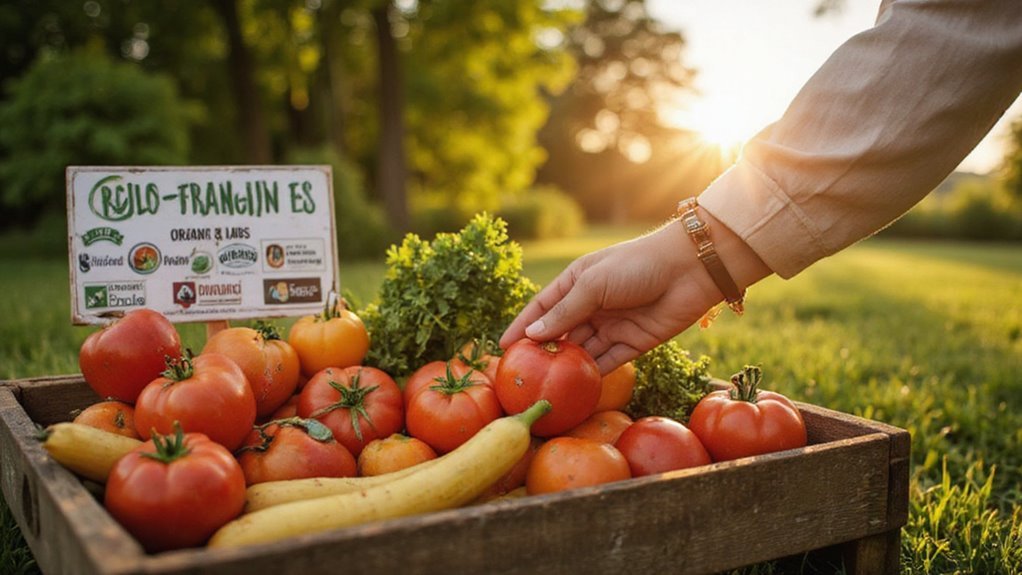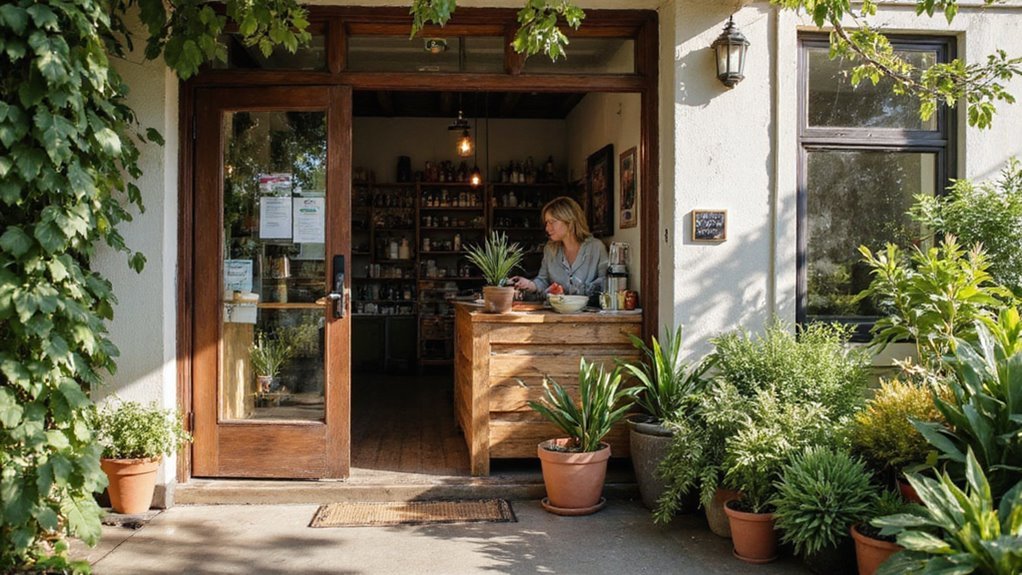If you’re aiming for organic certification to enhance your eco-retail business, support loans can be a game changer. They often require a solid business plan and proof you’re taking certification steps, in addition to financials showing you can repay. Grants and cost-share programs, like the USDA’s, can cover up to 75% of your certification fees—talk about sweetening the deal. Smart financing means you can afford certification and get to market more quickly. Stick around, and you’ll soon see how to make the entire process work to your advantage.
Key Takeaways
- USDA Organic Certification boosts market credibility and access, increasing your eco-retail business’s appeal to lenders and customers alike.
- Certification costs range from $750 to $3,000, but cost-share programs like OCCSP can reimburse up to 75% of expenses.
- Secure loans by presenting a solid business plan with clear financials demonstrating certification goals and repayment ability.
- Explore financing options including USDA loans and private lenders, focusing on interest rates, terms, and eligibility for sustainable business support.
- Third-party audits verifying organic compliance enhance loan applications by proving ethical sourcing and operational credibility to lenders.
Why Consumer Demand for Organic Products Makes Certification a Smart Investment

You want your eco-retail business for stand out, right? Getting organic certification lets you proudly display the USDA Organic seal, instantly building trust with customers who know that signifies real standards—not just vague “green” claims. It’s like wearing a badge in a marketplace crowded with buzzwords, helping you turn that growing demand into solid sales.
Building Credibility and Marketability with the USDA Organic Seal
While many shoppers might not dive into the fine print of product labels, the USDA Organic Seal speaks volumes without saying a word. By showcasing your commitment through organic certifications, you build instant credibility, tapping into the thriving $231 billion organic market. Additionally, the seal increases marketability—consumers willingly pay up to 30% more when they trust the product’s organic integrity.
| Benefit | Impact upon Business | Consumer Perception |
|---|---|---|
| USDA Organic Seal | Amplifies credibility | Trusts product quality |
| Certification Costs | Requires upfront budget | Justifies price premium |
| Consumer Demand | Expands market reach | Seeks organic assurance |
Investing in certification signals you’re serious and ready to meet demand—making those upfront certification costs a smart, innovative bet.
Understanding Key Differences: Organic Standards vs. Vague Green Claims
Although the market is flooded with products boasting vague “green” or “natural” claims, those buzzwords won’t do much to win over savvy customers—especially when they can’t verify what’s behind the label. You need clear organic standards that cut through the noise. Certifications offer just that: a trusted verification system that guarantees compliance with strict rules. Consumer demand for certified organic products is booming, and shoppers are willing to pay a premium for transparency and authenticity. Investing in these certifications isn’t just a feel-good move; it makes financial sense, too. Additionally, financial support programs can ease the upfront costs and help you meet compliance requirements without breaking the bank. Remember, real organic certification builds trust—vague claims just make customers raise an eyebrow.
Budgeting for Certification: A Realistic Financial Breakdown

Obtaining your eco-retail enterprise organically certified isn’t just about ticking boxes—it comes with a price tag that varies according to your business size and complexity. You’ll need to budget for application fees, inspections, and the ongoing costs that keep you compliant year after year (think about it as a subscription for trust). Comprehending these expenses upfront helps you avoid surprises and keeps your finances as fresh as your organic products. Additionally, considering smart financing solutions can help manage these costs effectively and maintain steady cash flowThe net amount of cash moving in and out of a business. throughout the certification process.
A Detailed Look at Certification Fees: Application, Inspection, and Ongoing Compliance
If you wish to budget wisely for organic certification, you’ll need to comprehend the various fees involved—because they accumulate more rapidly than you might anticipate. The application process alone can cost between $750 and $3,000 depending upon your certifier and operation size. Then come inspections, which might range from $300 to $1,500 per visit—kind of like paying for a thorough health check, but for your farm. Don’t forget ongoing compliance costs, typically $500 to $2,000 annually, in order to keep demonstrating you’re adhering to organic standards. Good news: some certifiers adjust fees based upon your revenue, making it easier for smaller businesses. Additionally, financial assistance for certification costs exists, so you’re not navigating solo here. Stay sharp with record-keeping—it’s your best ally during audits!
How Business Size and Complexity Influence the Total Cost of Organic Certification
When you’re budgeting for organic certification, the size and complexity of your business play a huge role in how significant you’ll need to reach into your wallet. Bigger operations often face higher costs due to extra documentation and compliance hoops, while smaller outfits can breathe easier with fewer fees. Here’s what to contemplate:
- Business size – Larger businesses usually shell out more because inspections and paperwork grow with your footprint.
- Complexity – Certifications for processing or livestock ramp up costs beyond simple crop certification.
- Funding and loans – In order to ease the sting, tap into USDA loans or cost-share programs designed specifically for businesses like yours.
Knowing these factors upfront keeps your budget realistic and your innovative dreams alive—plus, who says financing organic can’t be a little fun?
First Stop for Financial Support: Grants and Cost-Share Options

When one considers shouldering the costs of organic certification, grants and cost-share programs can be your best friends—yes, free money does exist in such a world! The USDA’s Organic Certification Cost Share Program, for instance, can cover a big chunk of your fees, and many states toss in their own bonus funds too. Let’s investigate how tapping into these options can turn that scary certification price tag into something much more manageable for your eco-retail dreams.
Deep Dive: The USDA Organic Certification Cost Share Program (OCCSP)
You’ve probably heard that organic certification can cost a pretty penny, especially when you’re just starting out or running a small eco-retail business. That’s where the USDA Organic Certification Cost Share Program (OCCSP) comes in, offering a breath of clear air for your financing worries. This program reimburses up to 75% of your certification costs—capped at $750 annually—helping sustainable businesses and farmers alike. Here’s how it assists you:
- Covers key fees like inspections and applications.
- Requires proof of payment and official certification.
- Supports small, underserved farmers making the organic leap.
While support loans handle upfront costs, OCCSP refunds part of what you’ve paid, easing financial stress and speeding your path toward organic certification. Smart moves here will set your eco-business apart and keep you innovating.
What Grants Are Available for Organic Certification? A Review of Federal and State Opportunities
Curious about where one can find some extra cash so as to help with your organic certification? Grants are a smart financial enhancement for producers like you aiming to showcase that USDA Organic seal. The USDA’s Organic Certification Cost Share Program reimburses up to 75% of certification fees, capping at $750 annually—think of it as a friendly nudge from Uncle Sam. Don’t forget state-level grants, like California’s Organic Program, which offer additional support customized for local producers. Federal initiatives, such as the Specialty Crop Block GrantNon-repayable funds given by an entity for a specific purpos Program and SARE, also create open doors for funding that indirectly supports your certification process through research and education. Keep an eye regarding nonprofits too—they often highlight fresh grantNon-repayable funds given by an entity for a specific purpos opportunities for organic certification. These financial opportunities make getting certified less wallet-worry and more growth-focused fun.
Securing Capital: A Comparison of Support Loans for Your Sustainable Business
Thinking about securing a loan for your eco-friendly business? You’ll want to compare USDA loans, private lenders, and traditional banks in order to find the best fit—kind of like dating, but with paperwork instead in place of flowers. Understanding loan requirements and planning for long-term growth can turn that financial headache into a clear path ahead.
USDA Loans vs. Private Lenders vs. Traditional Banks
When you’re ready for securing funding for your eco-retail organic certification, understanding your loan choices can feel like steering through a maze of financial jargon and fine print. Let’s break down your options for access to capital:
- USDA loans often come with lower interest rates and longer repayment terms. They’re perfect if you want funding along with some training to nail that organic certification.
- Private lenders may offer loans customized for sustainable businesses but watch out—the interest tends to be higher, which can tighten your profit margin.
- Traditional banks usually demand hefty collateralAn asset pledged by a borrower to secure a loan, subject to and stellar credit scores, making them tougher for startups to tap into.
Choosing the right mix means balancing cost, support, and flexibility. You want a loan that feels like a partner, not a hurdle.
Who Offers Loans for Eco-Retail Businesses?: Government and Mission-Driven Lenders
Finding the right loan to fuel your eco-retail dreams can feel like a treasure hunt, but luckily, there are some reliable guides in this expedition—government programs and mission-driven lenders. These options offer sustainable finance customized for your business’s green goals, easing your access to capital for business growth without the usual paperwork headache.
| Lender Type | What They Offer |
|---|---|
| USDA Business & Industry Program | Low-rate loans with government backing |
| Slow Money Institute | Loans focusing on social and environmental impact |
| Green America | Network access to eco-conscious lending |
| Community Development Financial Institutions (CDFIs) | Support for underserved sustainable businesses |
| Sustainable Agriculture Research and Education (SARE) | Grants promoting innovative agricultural practices |
These resources truly get who provides loans for eco-retail businesses like yours—fueling growth with heart and vision.
Evaluating Loan Terms: What Are the Requirements for an Organic Certification Loan?
Securing a loan for covering organic certification fees feels a bit like applying for a secret club membership—you need to show you’re serious, prepared, and ready to play by the rules. When evaluating organic certification loans, lenders want to see three things:
- A solid business plan explaining how the loan supports your certification goals and growth.
- Clear financial statements, including tax returns and cash flowThe net amount of cash moving in and out of a business. projections, proving you can handle the repayment periods.
- Proof of organic certification or active steps toward obtaining that, especially for USDA funding programs with favorable loan terms.
Interest rates usually hover between 3% and 8%, with repayment spanning 5 to 10 years. Nail these requirements, and you’re in your way to releasing capital that’ll grow your eco-retail business organically—and maybe a little bit magically.
How to Finance a Sustainable Business for Long-Term Growth
Though this might feel like chasing rainbows, financing your sustainable business for long-term growth is actually more within reach than you think—especially when you understand the variety of support loans designed specifically for eco-friendly ventures like yours. Your eco-retail business can tap into government-backed loans, like those from the USDA’s Farm Service Agency, or investigate local banks offering financing options crafted for sustainable business practices. These loans support business growth by covering organic certification costs and operational upgrades. Eligibility criteria vary, but many lenders prioritize your commitment to sustainability. Additionally, nonprofit grants and low-interest loans add extra options. With the right plan, you’ll turn that paperwork mountain into a stepping stone—soon, your organic certification won’t just be a badge, but a launchpad for thriving green success.
The Lender’s Perspective: Building Your Application for Success
When applying for a loan, lenders want more than just your passion for organic goods—they’re looking for a clear plan that shows how certification enhances your sales and keeps the money flowing. Third-party audits and airtight proof of ethical sourcing aren’t just red tape; they’re your financial credibility in view. Nail these details, and you’ll make lenders sit up and say, “Now that’s a business we want to support.” Demonstrating how you leverageUsing borrowed capital to finance assets and increase the po financing for bio-based products can significantly boost your store’s profitability and appeal to lenders.
Expert Insights: What Loan Officers Want to See in Your Business Plan
Even if you think your passion for organic products speaks for itself, loan officers want to see a business plan that clearly shows you’ve done your homework—and then some. They want proof you understand the certifications require compliance and how it drives business growth. To nail that, focus upon:
- Market analysis — Showcase your understanding of customer demand and competition in the organic sector.
- Financial projections — Provide detailed cash flowThe net amount of cash moving in and out of a business. and break-even points to verify profitability.
- Operational requirements — Outline your certification process, demonstrating commitment to sustainability and compliance.
Such thoughtful approach tells lenders you’re serious and ready to turn organic dreams into a thriving, innovative reality. Additionally, that saves you from the classic “I forgot a detail” panic during loan talks. Win-win!
The Role of Third-Party Audits and Verification in Proving Compliance
Securing a loan for your eco-retail business means you’ll need more than passion and good intentions—you’ll also have to prove that you play by the organic guidelines. That’s where third-party audits step in. These independent checks offer clear verification of your compliance with organic certification standards, making lenders feel like they’re handing money to a business that’s the real deal. Think of it as a friendly but firm referee ensuring you’re not just greenwashing. Detailed audit reports highlight your strengths and areas to tighten up, which can enhance your loan application by showing commitment and transparency. Lenders provide loans more confidently when they see this proof, knowing you’re serious about your eco-retail venture. So, utilize these audits to convert compliance from a checkbox into a competitive advantage.
Connecting Ethical Sourcing and Supply Chain Integrity to Financial Credibility
Because lenders want to back businesses that look solid and trustworthy, showing off your commitment toward ethical sourcing and supply chain integrity can do wonders for your loan application. When businesses seek financing, demonstrating how organic standards guide producers—and how certification audits verify standards—adds serious weight. Here’s why you should highlight that:
- Ethical sourcing proves you support sustainable business practices, which lenders love.
- Certifications reduce risks by ensuring steady, high-quality supply chains.
- Showing verified standards signals financial credibility, helping you secure capital more easily.
Strategic Resources for Sustainable Business Growth
You’ve got the certification, but do you know how to turn that shiny USDA Organic seal into real growth? Utilizing a financial modeling template can show you exactly how your certification pays off long-term, so you’re not just guessing or hoping for the best. Additionally, when you capitalize on your certified status in marketing and funding talks, you’ll soon see doors opening—and maybe even some wallets.
A Financial Modeling Template for Projecting Certification ROI
While exploring organic certification might feel like stepping into a financial maze, a well-designed financial modeling template can be your trusty map. This tool helps you project your ROI by balancing the costs of certification with the sweet rewards that eco-retail can offer. Here’s how the tool guides you:
- Pinpoint the exact costs—application fees, annual audits, and compliance must-haves—so you’re never caught off guard.
- Estimate increased sales by tapping into consumers’ willingness to pay a premium for organic products.
- Factor in savings from efficiencies and less waste, painting a full financial illustration of organic certification benefits.
With that template, you’ll confidently show lenders or investors how your organic certification isn’t just green—it’s green in your wallet, too.
Leveraging Your Certified Status for Marketing and Access to Capital
Once your business earns that USDA Organic certification, you unseal a powerful marketing tool that doesn’t just add credibility—it practically shouts trustworthiness for customers, lenders, and investors alike. Consumers prefer organic products, and flaunting your certified eco-friendly status sets you apart in a crowded market. Furthermore, audits verify standards regularly, assuring everyone that your sustainability claims aren’t just greenwashing. Such trust can open doors for grants for organic certification and new funding options, making it easier to learn how one might finance a sustainable business. Don’t forget: tapping into local sustainability networks and organic trade events can connect you with investors who value your planet-friendly mission. Use your certification smartly—it is more than a label; it’s your key to growth and capital!
Frequently Asked Questions
Is It Hard to Get USDA Organic Certification?
Is this hard? Oh, just a casual 3-6 month treasure hunt through paperwork, inspections, and strict rules. But if you thrive in organized chaos and innovation, you’ll turn USDA organic certification into your game-changing badge of honor.
Is Organic Certification Worth It?
Yes, organic certification’s worth it because it enhances your credibility, attracts eco-conscious customers, and opens new markets. It’s a strategic investment that raises your brand while aligning with growing demands for sustainable, transparent business practices.
How Much Does USDA Organic Certification Cost?
USDA Organic certification usually costs you between $500 and $2,000, varying by operation size and region. Don’t forget to budget for paperwork, inspections, and annual recertification fees in order to keep your status current.
Which Organic Certification Is Best?
You should choose USDA Organic certification—this is the gold standard that builds consumer trust and opens market doors. Pair this with B Corp or Fairtrade if your mission includes social impact or fair sourcing for added credibility.






